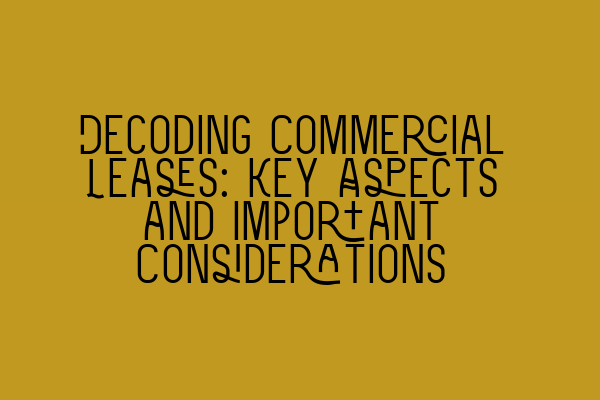Decoding Commercial Leases: Key Aspects and Important Considerations
Commercial leases are a fundamental aspect of property law, governing the relationship between landlords and tenants in various types of commercial properties. Understanding the key aspects and important considerations of commercial leases is crucial for both landlords and tenants to ensure a fair and mutually beneficial agreement. In this blog post, we will decode commercial leases, shedding light on key terms, clauses, and legal considerations.
1. Lease Term and Renewal Options
The lease term refers to the duration of the lease agreement, specifying the start and end dates. It is important to clearly define the lease term to avoid any confusion or disputes regarding the period of occupancy. Additionally, renewal options allow tenants the opportunity to extend the lease beyond the initial term. Landlords and tenants should carefully negotiate and document the renewal options to protect their interests.
2. Rent Payments and Escalation
Rent payments are a vital aspect of commercial leases. The lease agreement should clearly outline the rent amount, payment frequency, and acceptable methods of payment. It is also important to consider rent escalation clauses, which determine how and when the rent amount may increase over time. Landlords and tenants should carefully evaluate these clauses to ensure they align with their financial capabilities.
3. Maintenance and Repairs
Commercial leases typically outline the responsibilities for maintenance and repairs. Landlords usually have a duty to ensure that the property is kept in good repair, while tenants are responsible for reporting any damage and keeping the property in a clean and functional condition. It is important to carefully review these clauses to allocate maintenance and repair responsibilities clearly.
4. Use of Premises
The permitted use of the premises is a crucial consideration in commercial leases. Landlords often restrict the use of the property to specific activities to maintain the property’s value and comply with zoning regulations. Tenants should carefully review these clauses to ensure that their intended business activities align with the permitted use restrictions.
5. Assignment and Subletting
Commercial leases may include clauses regarding the assignment or subletting of the premises. Assignment involves transferring the lease agreement to another party, while subletting allows tenants to rent out a portion of the premises to a third party. Landlords usually have the right to approve or reject any assignment or subletting requests. Tenants should be aware of these clauses and their implications before entering into any agreements.
6. Termination and Lease Break
Termination clauses outline the circumstances under which either the landlord or the tenant may terminate the lease before the agreed-upon end date. These clauses may include conditions such as non-payment of rent, breach of lease terms, or other specified events. Tenants should carefully evaluate these clauses to understand their rights and obligations in case they need to terminate the lease prematurely.
7. Insurance and Indemnity
Commercial leases often require tenants to maintain adequate insurance coverage to protect against liability and property damage. Landlords may also have their insurance requirements. Additionally, indemnity clauses specify who is responsible for any financial losses or damages that may occur during the lease term. Tenants should carefully review and fulfill these insurance and indemnity obligations.
8. Dispute Resolution
In the event of a dispute between the landlord and tenant, commercial leases often include clauses that specify the preferred method of dispute resolution. These can include negotiation, mediation, or arbitration. It is essential to understand the dispute resolution mechanisms outlined in the lease and seek legal advice if necessary.
Understanding commercial leases and the intricacies of their terms and conditions is paramount for both landlords and tenants. By decoding the key aspects and important considerations discussed in this blog post, you can enter into a commercial lease agreement with confidence and ensure a successful and mutually beneficial business relationship.
For further information on the SQE exams and preparation, check out these related articles:
